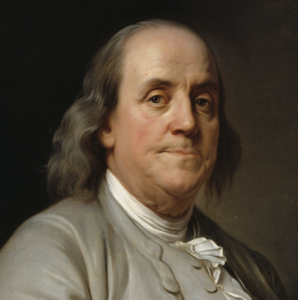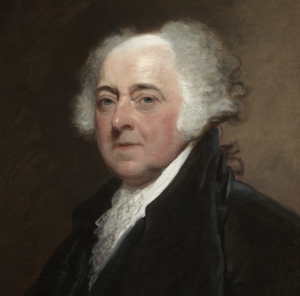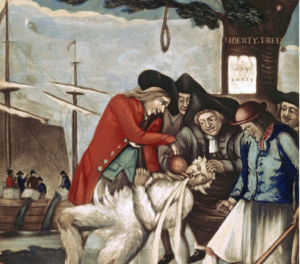 “[John Adams] told his friend Benjamin Rush in 1790, that his role in the Revolution would never be properly recognized. The essence of the Revolution, he moaned, ‘will be that Dr. Franklin’s electrical rod smote the earth and out sprung General Washington. That Franklin electrified him with his rod –and thence forward these two conducted all the policy, negotiation, legislatures and war.'” (Wood, p. 175)
“[John Adams] told his friend Benjamin Rush in 1790, that his role in the Revolution would never be properly recognized. The essence of the Revolution, he moaned, ‘will be that Dr. Franklin’s electrical rod smote the earth and out sprung General Washington. That Franklin electrified him with his rod –and thence forward these two conducted all the policy, negotiation, legislatures and war.'” (Wood, p. 175)
 “But no one summed up Adams’s character better than Franklin, who famously described him as a man who ‘means well for his Country, is always an honest Man, often a Wise One, but sometimes and in some things, absolutely out of his senses.'” (Wood, p. 177)
“But no one summed up Adams’s character better than Franklin, who famously described him as a man who ‘means well for his Country, is always an honest Man, often a Wise One, but sometimes and in some things, absolutely out of his senses.'” (Wood, p. 177)
FRANKLIN & THE STAMP ACT CRISIS (1765)
YAWP: “Resistance to the Stamp Act took three forms, distinguished largely by class: legislative resistance by elites, economic resistance by merchants, and popular protest by common colonists.” (Chap. 5, Sec. III)
WOOD: “[Franklin] told [Philadelphia stamp collector John] Hughes to remain cool in the face of the mobbings. ‘A firm Loyalty to the Crown and faithful Adherence to the Government of the Nation …’ he said, ‘will always be the wisest Course for you and I to take, whatever may be the Madness of the Populace or their blind Leaders.'” (p. 80)
US-FRENCH ALLIANCE (1778-1783)
 YAWP: “The Continental Army defeated Burgoyne’s men at Saratoga, New York.41 This victory proved a major turning point in the war. Benjamin Franklin had been in Paris trying to secure a treaty of alliance with the French. However, the French were reluctant to back what seemed like an unlikely cause. News of the victory at Saratoga convinced the French that the cause might not have been as unlikely as they had thought. A Treaty of Amity and Commerce was signed on February 6, 1778. The treaty effectively turned a colonial rebellion into a global war….” (Chap. 5, Sec. V)
YAWP: “The Continental Army defeated Burgoyne’s men at Saratoga, New York.41 This victory proved a major turning point in the war. Benjamin Franklin had been in Paris trying to secure a treaty of alliance with the French. However, the French were reluctant to back what seemed like an unlikely cause. News of the victory at Saratoga convinced the French that the cause might not have been as unlikely as they had thought. A Treaty of Amity and Commerce was signed on February 6, 1778. The treaty effectively turned a colonial rebellion into a global war….” (Chap. 5, Sec. V)
WOOD: “Despite these difficulties, [Franklin] succeeded admirably. He was the greatest diplomat America has ever had. Not only did he bring the monarchy of Louis XVI into the war on behalf of the new Republic, but during the course of that long war he extracted loan after loan from an increasingly impoverished French government. No other American could have done what he did … It was Franklin’s genius to know what the French wanted from him and to play his part to perfection. He dressed in a simple brown and white linen suit and wore a fur cap, no wig, and no sword at Versaille, the most elaborate and protocol-ridden court in all of Europe. And the court and the French nobility loved it.” (p. 87)
JOHN ADAMS, ABIGAIL ADAMS AND WOMEN’S RIGHTS (1776)
AA to JA, March 31, 1776: I long to hear that you have declared an independancy—and by the way in the new Code of Laws which I suppose it will be necessary for you to make I desire you would Remember the Ladies, and be more generous and favourable to them than your ancestors. Do not put such unlimited power into the hands of the Husbands. Remember all Men would be tyrants if they could. If perticuliar care and attention is not paid to the Laidies we are determined to foment a Rebelion, and will not hold ourselves bound by any Laws in which we have no voice, or Representation.That your Sex are Naturally Tyrannical is a Truth so thoroughly established as to admit of no dispute, but such of you as wish to be happy willingly give up the harsh title of Master for the more tender and endearing one of Friend.
JA to AA, April 14, 1776: As to your extraordinary Code of Laws, I cannot but laugh. We have been told that our Struggle has loosened the bands of Government every where. That Children and Apprentices were disobedient — that schools and Colledges were grown turbulent — that Indians slighted their Guardians and Negroes grew insolent to their Masters. But your Letter was the first Intimation that another Tribe more numerous and powerfull than all the rest were grown discontented. — This is rather too coarse a Compliment but you are so saucy, I wont blot it out. Depend upon it, We know better than to repeal our Masculine systems. Altho they are in full Force, you know they are little more than Theory. We dare not exert our Power in its full Latitude. We are obliged to go fair, and softly, and in Practice you know We are the subjects.
For the full correspondence from that period between Abigail and John Adams, see the Yawp supplemental page.
Discussion Question
- How does the 1776 exchange between Abigail and John Adams illustrate some of the challenges that John Adams faced adapting his vision of republicanism to those of other American revolutionaries, especially during the 1780s and 1790s?
Handout

